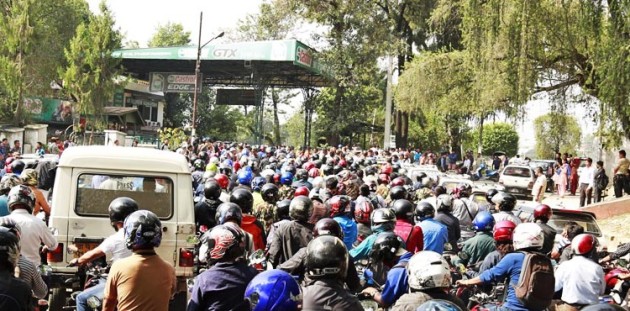Nepalese reel under an economic blockade in a state of denial

People at a queue in petrol station of Kathmandu. Recently government did not provide fuel to private vehicles.
By Manoj Karki : Nepal is gradually running out of essential commodities including fuel as imports from all accessible transit points to the landlocked country have come to a grinding halt.
There have been reports of hospitals across the country too running out of stock of their medicines and other goods essential to keep themselves up and running.
These are all taking place on the eve of the predominantly Hindu populated Nepal’s greatest festival of Dashain. People are thus being deprived of observing the annual home-coming festival to the fullest, as travelling is almost impossible and cost of essentials have skyrocketed in the market for lack of regular import.
It may be noted that life in Nepal has just been limping back to normalcy following the April 25 earthquake that killed around 9,000 people, injured over 23,000 and destroyed around 100,000 homes.
Serpentine queue of vehicles lined up before every gas station across the country, sporadic traffic on the otherwise jam-packed city roads, people travelling on roof-tops of buses, restaurants offering only salad and barbeque and increasing demand for firewood are enough evidence to show that the tiny himalayan nation is under severe crisis, courtesy the big neighbour that surrounds it on all three accessible sides.
Ironically though there has been no official declaration so far that it is an economic blockade on the country. It is understandable for the one committing the act to deny it. But surprisingly, even the sufferer has not been able to tell that I am under an economic blockade.
A huge debate is reported to have taken place during the meeting of the Nepali Congress central working committee to whether or not use the word ‘blockade’ Some ministers from the party have even gone on public saying that there is no blockade as such. After much backlash, they have mustered the strength to only call it obstruction on the border points.
The Nepali Ambassador to country of origin of the blockade as well as the Minister responsible to ensure supply of fuel and essential commodities are too in a state of denial even after three weeks since the blockade began.
On the other hand, the leaders of the Madhesh-centric parties, who are staging sit-in at various border points in expression of their protest against the new constitution, have claimed that it is not India but them who are blocking supplies into the country. Some have even gone to the public in acknowledging and thanking neigbouring India for its support to them in choking their own fellow countrymen and women.
With no official claims of a blockade from any side as yet, media reports too have been describing the act with terms like unofficial or undeclared blockade. The reality however is it’s a de facto blockade.
Ironically, the Indian Ministry of External Affairs or MEA statement on October 8 said ‘there is no blockade on Nepal official or unofficial, border posts remain open and trucks are also moving’. Data released by media on the same day said a total of 5,033 trucks laden with fuel and goods were waiting at six various border points.
Though claims by the Indian side that obstructions at various points was the reason behind the clogging of the goods carrier trucks, the situation was in fact the same even in points where there were no protests whatsoever like in Kakarvitta in east and Gaddachowki in Kailali in the west.
And blockade whether official, unofficial or de facto the truth is that Nepal and Nepalis have been hit hard, physically in terms of the trouble that they have been facing in their day-to-day life since the past three weeks and emotionally since coming to know that the big neighbour on the east, south and west does not have a heart big enough to embrace her for drafting a new constitution of its own, at the backdrop of a devastating earthquake. The physical scars may heal and vanish as time passes by but the damage caused to Nepali heart and emotions is certain to last for a long time to come. RSS
